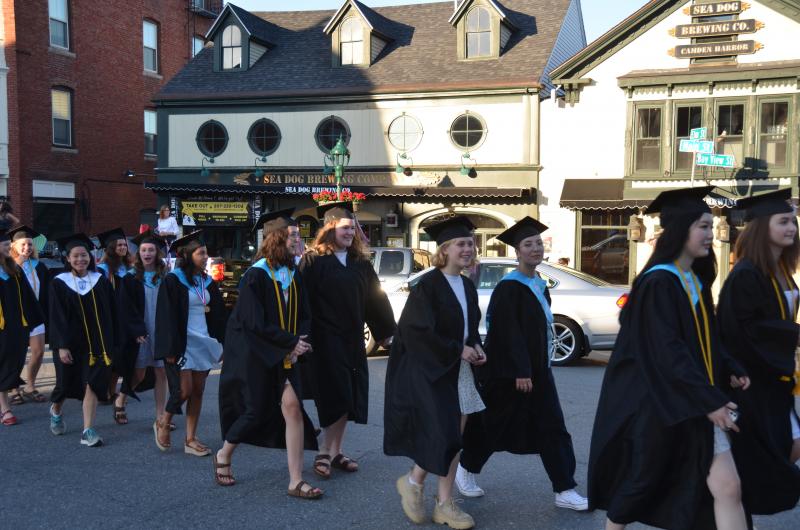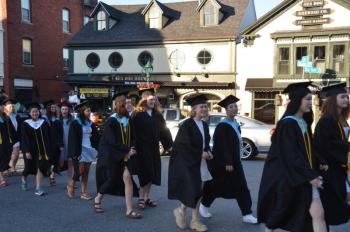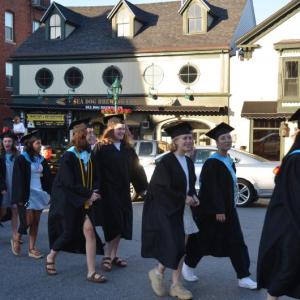The young, the old, and the virus
Have those of you who are getting on in years, as I am, thought lately about how much we elders owe to the younger people who have sacrificed so much to save us from the dreaded virus? And about how we can and should reciprocate?
The “novel” coronavirus is a weird phenomenon that refuses to behave the way it’s supposed to, meaning there are many ways to think about and react to it. Perhaps the generational perspective is one among the many that deserves more consideration. Perhaps a few of the same kind of “thank you” signs that are – appropriately – held up for medical personnel should have been on view as the Camden Hills seniors paraded through town last Thursday evening.
After all, as everybody knows by now, most deaths from coronavirus are older people. Roughly three-quarters of all those who die from the virus are over 65, according to data from New York City. Those under 45 account for less than 4% of deaths, and those under 17 for a negligible 0.06%.
Yet not just Camden Hills but schools across the world have been closed for months, depriving students of not only education but companionship, sports, music, art, so much. And it’s unclear when schools will reopen on an in-person basis. School closures have left millions of mostly under 45-year-old parents with no childcare. It has also left many with no jobs, and the lucky ones working from home, cooped up with their kids. College and other graduates face a grim employment and earnings outlook.
Millennials have been hit with a double whammy from both the Great and the Viral Recessions in what should have been the buildup to their peak earning years. Small businesses all over the world – many started by young people -- are closing while governments pour trillions of dollars into efforts to pump up the economies they purposefully shut down.
What does juxtaposing these widely known facts tell us? That young adults and children across this country and the world are accepting massive social, economic and educational losses in order to save us old folks. And while some – both young and old -- are starting to rebel at keeping the constraints in place indefinitely, you almost never hear young people say they’re sick of sacrificing for the old.
What have we, baby boomers and our parents, done to deserve this outpouring of generosity? Many of us raised young people now making such sacrifices. At a personal level, this connection obviously means a huge amount: Our kids love us and want to keep us around. And, thankfully, many of us still have a lot to give to our communities and the world at large.
From a broader societal lens, though, we haven’t done very well by our children and grandchildren. We have saddled them with staggering amounts of student debt – an estimated $1.4 trillion at end-2019 – and precious little net wealth. The share of US wealth held by baby boomers when they were 35 was 21%, compared to just 9% for Gen Xers (born 1965-80). Millennials (born 1981-96) aren’t yet 35, but they currently hold a mere 3.2% of net national wealth and weren’t on track to catch up to the Gen Xers, much less us, even before the coronacrisis.
That’s wealth. The income outlook for young people is also bleak. While 90% of those over 55 earned more than their parents did, half or less of those born since have a chance of doing so, according to researchers from Harvard, Stanford and Berkeley.
It would seem that, at a societal level, young people have little reason to be kind to us oldsters. Yet in the coronacrisis, they have been incredibly kind, at an incredibly high cost to themselves. Isn’t it about time we over-60s showed a little appreciation?
A good place to start would be to vote for people and support policies to deal with the climate crisis that so justifiably terrifies so many of the young – to take better care of the planet they will inherit.
Vote for people who favor free higher education and absolving student debt.
Support government-funded health care for everyone, not just everyone over 65, as is now the case.
Open our minds to what the young are saying.
Help our generation quit being the least generous, most tight-fisted voting bloc in the country. Reciprocate.
Event Date
Address
United States





























